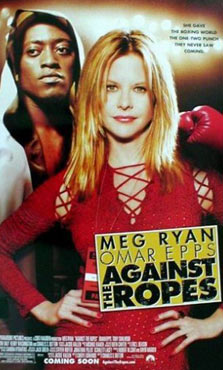 There’s a smart scene in Charles S. Dutton’s “Against The Ropes” in which the penniless Jackie (Meg Ryan) negotiates the sale of some jewelry to promote her fighter. The officious pawn-shop broker low-balls her, and, knowing she’s already at rock bottom, we start to worry as the corners of Ryan’s mouth sag, her chin wobbles, and her blue eyes blink distractedly. Is she breaking down? Then, with a sigh, she makes a final offer, capped with an expertly pathetic, eyelash-batting “Please don’t screw me over any more than that. I have kids.” But we know Jackie’s not a mother. And now, amusingly, we know she’s fast on her feet. There’s a smart scene in Charles S. Dutton’s “Against The Ropes” in which the penniless Jackie (Meg Ryan) negotiates the sale of some jewelry to promote her fighter. The officious pawn-shop broker low-balls her, and, knowing she’s already at rock bottom, we start to worry as the corners of Ryan’s mouth sag, her chin wobbles, and her blue eyes blink distractedly. Is she breaking down? Then, with a sigh, she makes a final offer, capped with an expertly pathetic, eyelash-batting “Please don’t screw me over any more than that. I have kids.” But we know Jackie’s not a mother. And now, amusingly, we know she’s fast on her feet.
Her feline skullduggery is one of the surprising joys of “Against The Ropes”, the new boxing film “inspired” by the life of Jackie Kallen, one of the few successful women managers in the sport. There’s a subtle freshness here: how often does a feel-good Hollywood biopic feature a heroine who’s a paragon of mendacity and ruthlessness? Such are the tools of a trade that requires the backstabbing machinations of Senators and the histrionics of pro wrestlers. Jackie has certainly mastered the look of the latter: her ringside costumes—Xena Warrior Princess meets Tanya Harding—make her look like one of Vince McMahon’s buxom retinue.
Jackie’s waggish wit and maternal touch are amusing to watch as she struggles to crack a sport dominated by relentless sexists. She earns our respect not by changing the standards of the industry but rather by going toe-to-toe with the big boys on their terms. Her uncle, a fighter gifted with a talent for post-feminist pep talks, informs the 12-year old Jackie that she’s a ‘pearl’: “pretty and tough, and that’s pretty tough”. Now that’s a heady prediction to live up to, but of course she grows up to be just that. Her managing tactics range from back-room blackmail to the nefarious deployment of laxatives. She’s canny in the ring, too, though she likes to toss out sub-Lombardi rah-rah like “Let’s spit in the eye of destiny” and “Well, he’s never seen ferocity in high heels!”
Clearly there’s some Erin Brockovich in Jackie. Despite the flesh-flaunting, Ryan, like Roberts before her, sometimes fails to convince us of her character’s fearlessly plebian roots. Bad taste in clothes can’t distract us from Ryan’s albatross—that big, radiant smile, made more for romantic comedies than the steamy bloodlust of the boxing ring. The prizefighting sequences are adequate, for the most part, but there are some deficiencies. Omar Epps’ “Lethal” Luther Shaw has no discernible fighting style. The supposedly fearsome opponent in the climactic fight resembles something like a tower of angry cookie dough. Most of the fights are edited into a muddle, and at one point, in an amazing reversal of physics, a knockout uppercut somehow causes one of Shaw’s victims to fall forward.
In fairness, boxing is incredibly difficult to render onscreen for any director not named Scorsese. Knowing this, Dutton consciously sidesteps the lasagna-faced splatter of “Raging Bull” to give more time to the fine supporting cast, which includes a credibly beefed-up Epps, Tony Shalhoub as a rival promoter, and Dutton himself as Felix, Shaw’s laconic trainer. Shalhoub is particularly wonderful as Mob boss Larocca. More Tony Soprano than Don King, his rapidfire Mamet riff captures the underworld of fight promoting in a single sneering caricature. Surprises in a film like this are rare, but it’s a credit to Dutton and writer Cheryl Edwards that the story almost creates suspense before losing itself in cliché.
“Almost” because Michael Kamen’s score—unthreatening piano and orchestra melodies unrolling over soft, mid-tempo drumming—bulldozes through many scenes, giving “Against The Ropes” a Movie-of-the-Week lameness. Take the sequence early on, when Jackie finds out that Shaw has been blacklisted from every boxing venue in the Midwest. We watch Jackie suffer rejection after rejection as she tries to book Shaw. But no need to worry, as any thoughts that Shaw’s career might be derailed (drama, in other words) are slowly bled from the screen by the sort of “uplifting” backing music normally heard in corporate training videos and aspirin commercials.
“Against The Ropes” never aspires to more than standard Hollywood entertainment. Although it realizes that modest ambition, it’s still good enough to feel like a missed opportunity. Edwards’ script hits all the right notes, but they’re the safe ones. As with most biopics of the living, there’s far too much respect for the subject. For instance, it seems only natural, given Jackie’s clear and present sexuality, to wonder about the possibility of attraction between her and Shaw. But aside from a quick moment of faint jealousy, Edwards takes the story in the opposite direction. There’s a defining scene in which Shaw tells Jackie she’d be a “dope” mother and then hugs her for taking care of him: in with the schmaltzy Hallmark affirmation, out with the sexual tension. Ironically, it’s the absence of dramatic risk in “true stories” like this that ultimately makes them less realistic than fictions. |